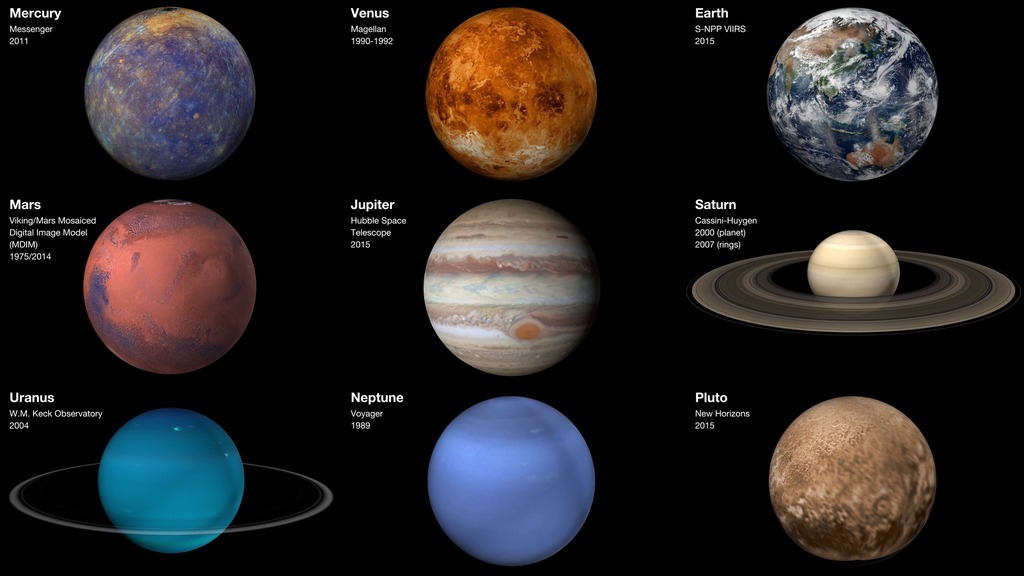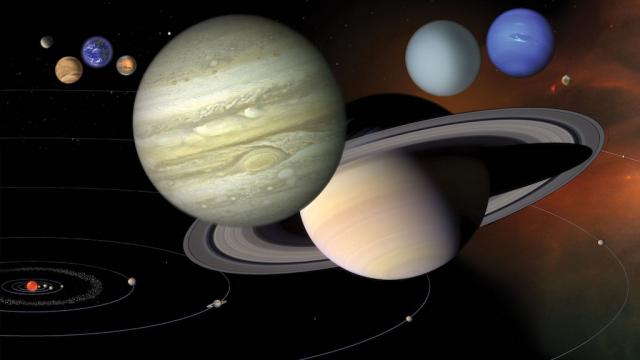Millennials have already lost so much: A relatively secure housing market, the hope of stable careers, and an Earth that wasn’t completely littered with the mistakes of Baby Boomers. So when Pluto was demoted to a dwarf planet in 2006, it was another nail in our fragile hearts. But that hasn’t stopped astronomers of all ages debating about whether or not Pluto — and other objects in our solar system — are, in fact, planets. Pluto could be a planet, because the very word “planet” is a bit nebulous, even for experts.
Image: Wikimedia Commons
Today, planetary geologist Kirby Runyon will present a new definition of “planet” at the 48th Lunar Planetary Science Conference in The Woodlands, Texas, undoubtedly rekindling the flames of controversy. Runyon’s definition does away with a key International Astronomical Union (IAU) requirement for planethood — namely, that the object is massive enough to clear the neighbourhood around its orbit. Instead, it focuses on the geophysical properties that set planets apart from smaller and less complex objects. A planet, according to Runyon, is “A substellar mass body that has never undergone nuclear fusion and that has enough gravitation to be round due to hydrostatic equilibrium regardless of its orbital parameters”. By this definition, many moons in our solar system — including our own — would be reclassified as planets.
Runyon’s definition could be a game changer for a few reasons. From a scientific standpoint, it’s much more inclusive than the IAU’s, meaning there would be a lot more planets in our Solar System — more than a hundred. He hopes this system would promote a different way of learning astronomy, one that focuses more on concepts and less on memorising arbitrary celestial objects.
From a public interest perspective, Runyon’s argument gets at the crux of this debate — that perhaps, the glamour and gravity of the word “planet” bolsters the case for sending a mission to explore it. But again, this idea could also be nebulous — Gizmodo reached out to Runyon for comment but had not heard back at time of writing.

Image: NASA
Some scientists assert there’s absolutely no confusion about the definition of a planet. Caltech astronomer Mike Brown, who famously helped demote Pluto with his discoveries of other large Kuiper Belt Objects beyond its orbit, told Gizmodo that the planets in our own solar system don’t require much back-and-forth debate at all, and a cursory glance at our current planets proves this.
“It’s really a very clear cut concept on what is a planet and what is not,” he said. “At least in our solar system, there are no grey areas at all, since it’s divided itself so nicely. If you look at our solar system with fresh eyes, you see there are eight big objects in these beautiful stately orbits going around the Sun, minding their own business and kicking out anything that gets close to them. The difference between the dominant and submissive objects is extreme.”
Brown advocated for Pluto’s demotion to dwarf planet status on the grounds that it does not clear its planetary neighbourhood of objects in the Kuiper Belt. The decision was met with instant controversy that hasn’t entirely quieted down — Brown admits that he receives hate mail about it to this day. Naysayers aside, he maintains there’s a good reason to classify planets according to the IAU’s current model.
“People who are trying to change the definitions will often say things like, ‘It’s harder to justify the Pluto mission if Pluto’s no longer a planet,’” he explained. “To that I say, ‘If you can’t justify a billion dollar mission without having to change around whatever everybody thinks about the planet, really someone should take away the keys to your spacecraft.”
Above all, Brown isn’t sold on the idea that granting something planetary status makes it more important.
“That is not a good reason to have the definition of planet — that’s a good reason to have a better PR person,” he said.
But the fact remains that there is a certain gravity (no pun intended) to granting something planetary status. While astronomers and planetary scientists are keen to explore moons like Enceladus and Europa because of their potential to support alien life, these aren’t objects kids in primary school are usually learning about in their science classes. Would that change if we called them planets?
“The word ‘planet’ has changed its meaning over 2000 years of human scholarship on the subject, and most people don’t understand that,” Vanderbilt University professor of astronomy David Weintraub told Gizmodo. “They think that a lot of ideas, a lot of words… their meanings are embedded in stone and never change. But as our knowledge of the universe changes, our vocabulary that we use to understand what we know about the universe changes.”
Weintraub asserts that for better or worse, vocabulary “drives the way we think about things”, in this case, about planets.
“The whole conversation is about the way we think about things in the universe, so it’s about us, it’s not about the object,” Weintraub said. “It’s about how we learn and understand those objects.”
Runyon’s definition wouldn’t necessarily negate the IAU one. But it would offer an alternative that could help astronomers and educators convey why lesser-known celestial objects — ones that we don’t have mnemonics to memorise — are just as interesting as Jupiter and Neptune. So, why not both?
